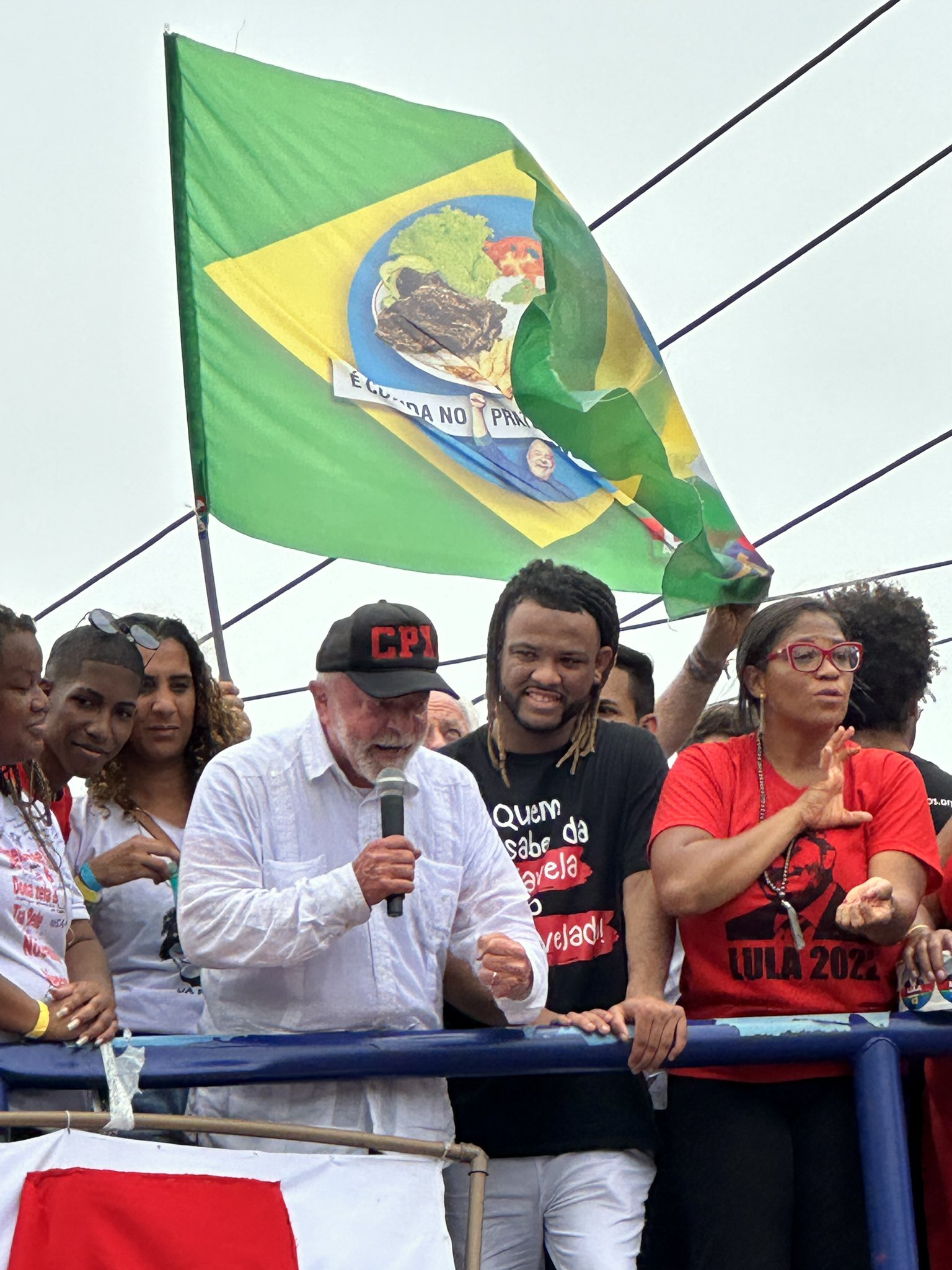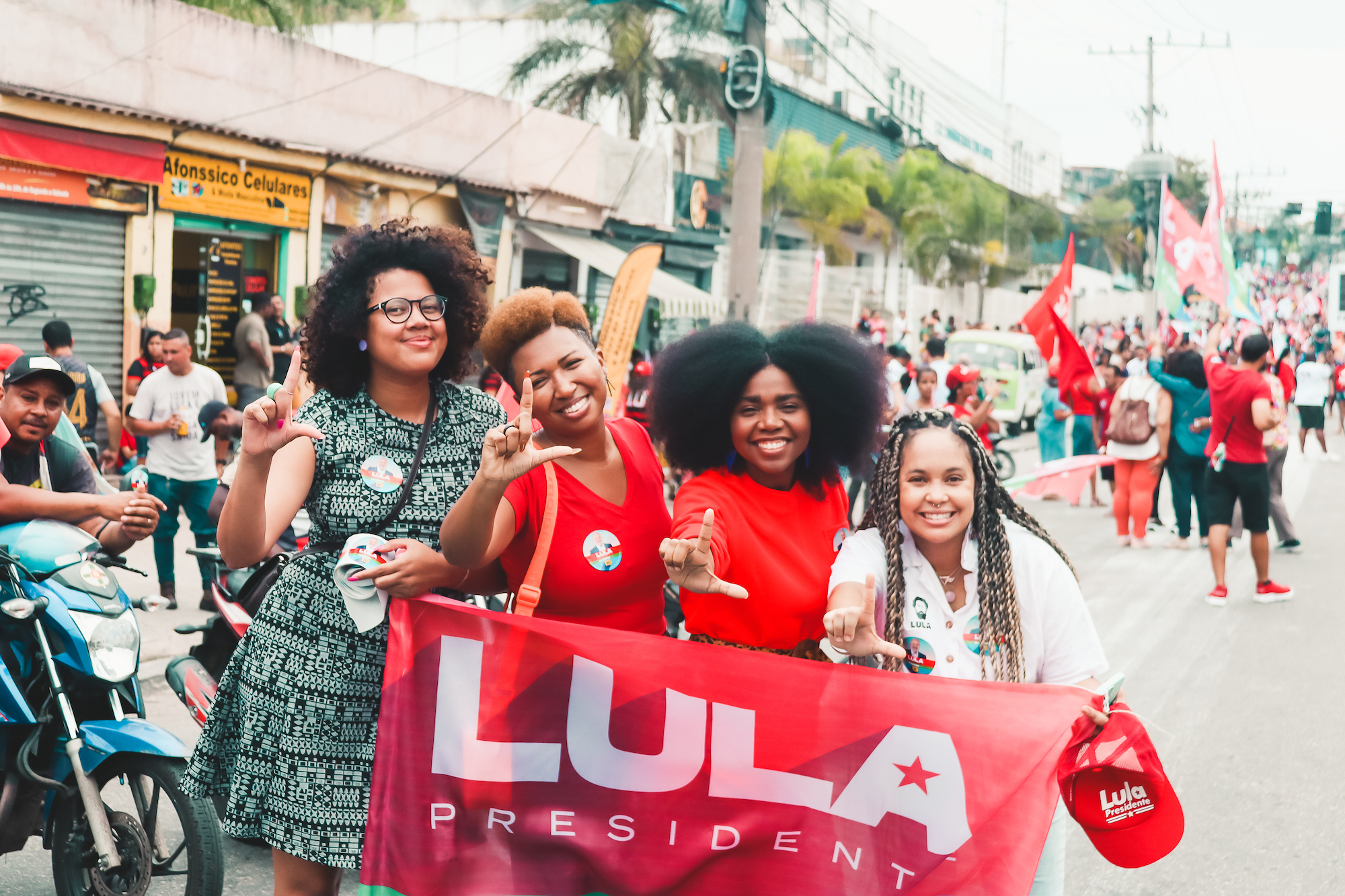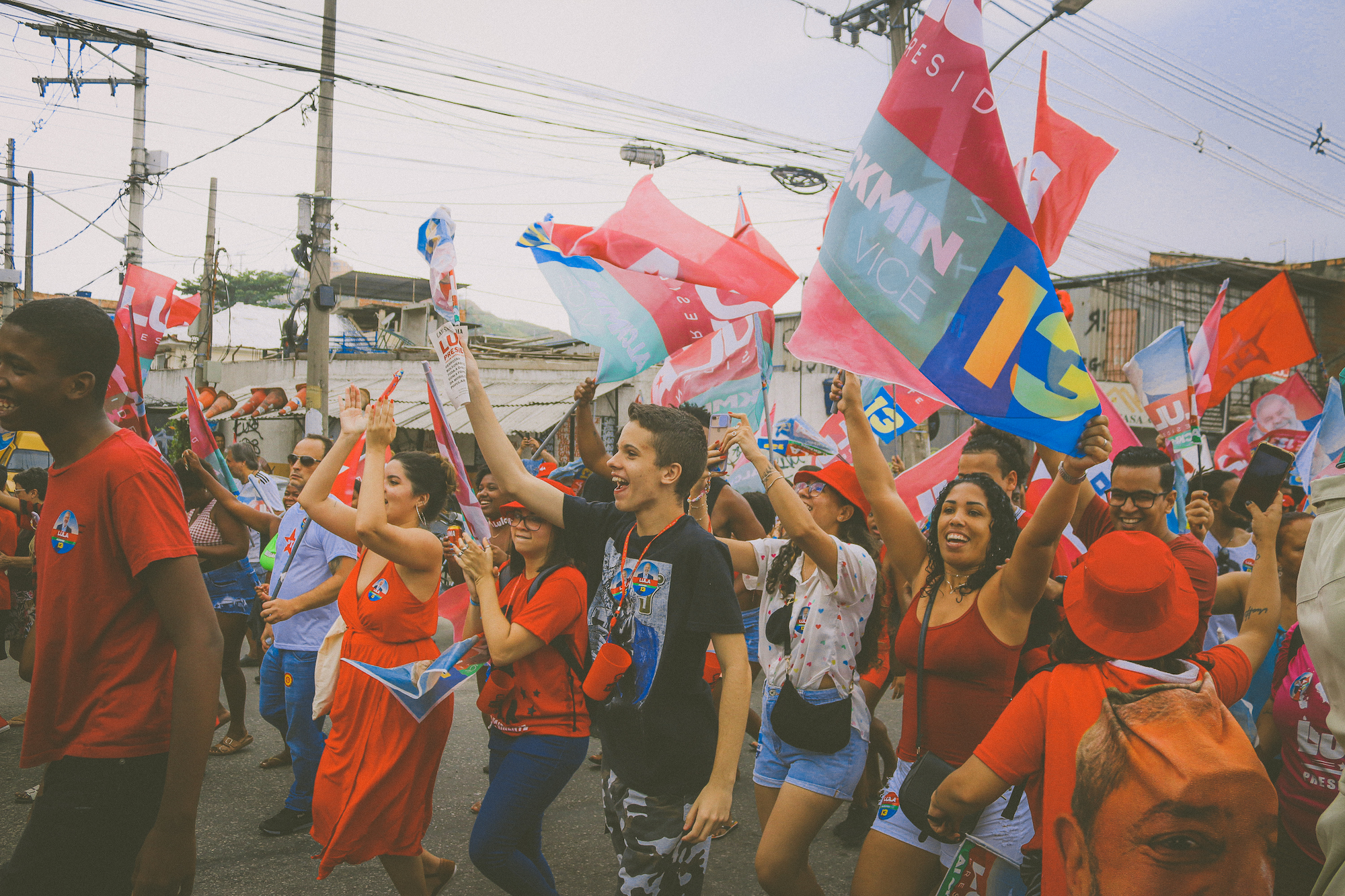On the Brazilian holiday of October 12—the Day of Our Lady of Conception—a rally in support of presidential candidate Luiz Inácio “Lula” da Silva took place on Itararé Road, one of the main roads in the Complexo do Alemão grouping of favelas, in the North Zone of Rio de Janeiro. The Workers’ Party (PT) candidate had led in the first round of Brazil’s presidential election with the largest ever recorded vote. According to the Superior Electoral Court (TSE), Lula received 57,259,504 votes, 48% of all votes that were cast. For an all-out victory in the first round, 50% would have been necessary. While this was an impressive result, many supporters were frustrated that the electoral process would continue through the second round, which will be held on October 30.
Local Movements and Organizations Invite Lula do Dialogue

René Silva—founder and director of the internationally-known community newspaper Voz das Comunidades—invited Lula to Complexo do Alemão for a march with Lula event, organized so that a direct, constructive dialogue with the favela could be established. Lula is widely recognized in Brazil for his policies that reduced inequality and grew the middle class, especially in favelas.
“It is the realization of a very big dream. Not only for me, but for the favela as a whole, to have this meeting here in Complexo do Alemão. Other meetings with favela leaders have happened in the past, but they were inside hotels and I always said that we needed to do a meeting like this within the favela and for the favela.” — René Silva
Lula’s itinerary in Complexo do Alemão began with a meeting at the headquarters of Voz das Comunidades, in the lower part of Morro do Adeus. The candidate and his wife, Janja Silva, attended an 8am breakfast with community leaders from Complexo do Alemão and other favelas such as Acari and Manguinhos, as well as elected federal and state deputies Benedita da Silva (Workers’ Party, PT), Renata Souza (Socialism and Liberty Party, PSOL), Talíria Petrone (PSOL), Tarcísio Motta (PSOL), Glauber Rocha (PSOL), Dani Monteiro (PSOL), and Mayor Eduardo Paes (Social Democratic Party, PSD).
Only four community leaders were able to speak directly with the former president, among them Alan Brum, director of the Roots in Movement Institute. He handed the former president and current candidate the CPX Popular Action Plan, developed by 18 grassroots organizations from Complexo do Alemão. The document is the result of extensive discussions among residents and community leaders from the 13 favelas that make up the favela complex, who identified essential needs, aspirations, and ways to promote improvements within the community.
“Through this event with Lula’s campaign, the Workers’ Party government has opened a critical space for dialogue not only with Complexo do Alemão, but with other favelas. It just took place here. The goal was to listen and understand the local demands and, even more importantly, what form and relationship we want to establish with [Lula’s] future mandate. He made the commitment, based on our demands, that in the first 100 days of office he will create a national commission of the peripheries to develop public policies for Brazil’s urban peripheries. He committed to the agenda of establishing a relationship with the urban centers.” — Alan Brum
During the meeting with Lula, Brum requested that life return to the center of the debate and become the focal point of public security policy, because “we are tired of dying.” Besides the Complexo do Alemão Popular Action Plan, he also presented a health plan produced by another local organization, Educap, by its coordinator Lucia Cabral.
Lula also met with an elderly couple from Manguinhos who had stood at the local community market with a box labeled “Lula’s Ear” collecting the demands of favela residents. Manguinhos resident Bezerra da Silva explained that the project resulted in 200 messages from residents to former president Lula.
Event Marks Powerful Exercise of Democracy
This is the first time that a candidate for the Presidency of Brazil has held a rally with favela residents during a political campaign vying for the second round of electoral votes. For Lúcia Cabral, Educap coordinator, the event—organized by favela residents together with Lula’s campaign coordinators—represents democracy being exercised.
“Lula being here in the community is building democracy. This is the most important aspect of the event today. We have him as a reference from the favela to the favela. He will work on the social policies that we really need. This meeting with the leaders and the walk [in the community] are very important at this moment to stop the violence against our democracy from the poor administration of these last four years.” — Lucia Cabral
For her, Lula’s meeting with community leaders and residents of Complexo do Alemão was an opportunity to give Lula “the straight talk from the favela” without intermediaries, through the four community representatives who had his direct ear.
And the straight talk was direct and clear, says Cabral: “The straight talk was that he has to govern [in partnership] with the favela and for the favela.” She concludes with: “And I leave this meeting feeling that our former president Lula is with us.”
The meeting between presidential candidate Lula and community leaders was broadcast on the campaign’s YouTube channel. One of the key organizers was activist and human rights defender Camila Moradia, in addition to the Voz das Comunidades team, other leaders, residents and volunteers, together with the Rio de Janeiro city government and municipal secretariats.
Moradia, one of the founders of the Women in Action Movement in Alemão and a member of the Fight for Housing Commission, was one of four leaders present representing the favela movement. She gave a speech entitled “We will vote for Lula.”
“We will vote for Lula for the right to live. The favela votes for Lula today so that once again our main agenda is living. We will vote for Lula for our families, mostly headed by women and solo mothers. We will vote for Lula for the present and future of our children. We will vote for Lula for access to education and quality health care. We will vote for Lula for dignified housing and an end to forced evictions. We will vote for Lula for jobs with dignity. We will vote for Lula so that we, the poor and favela residents, can enjoy culture, leisure, and sports, everything for our children, youth, and ourselves. We will vote for Lula for entrepreneurship and for income generating projects and programs. We will vote and elect Lula so that legitimacy and legality will always be given to dialogue with the people. The fight for access to rights and the fight against all and any form of prejudice. For a Brazil for all, where God is among us. We are with Lula, we will vote Lula, we will elect Lula against hunger, with hope and faith.” — Camila Moradia
Born and raised in Parada de Lucas, Marcelle Decothé reminded Lula that it is the favela itself that can best speak on behalf of the favela.
“I have three messages in my three minutes to speak. The first message is: the places that elected and voted heavily for Lula as president were the favelas and peripheries, Maré, Parada de Lucas, Alemão, Rio das Pedras… And today we have created this movement to take over your campaign in Rio de Janeiro to say: we know how to conduct an electoral strategy and we are going to talk to our family, our people. Evangelicals? They are our mothers! Our families are the ones who went hungry. And it is we who are taking your campaign by storm at this moment in Rio de Janeiro to say: we are the ones who speak to our own people.” — Marcelle Decothé

The second message from Decothé came after she described how she was a beneficiary of affirmative action, gaining access to university through the public policies developed under Lula’s previous presidential terms. Above all, Marcelle’s second point was a suggestion: she proposed to candidate Lula that, if elected, he should set up a People’s Cabinet of Peripheries.
“In the first 100 days of your government, you can nominate your ministers, staff your ministries and send around the country community leaders to listen to demands and deliver a people’s plan of improvements for Brazil. Because it is from there that we will build the unity of peripheries that we want and need.” — Marcelle Decothé
One of the most moving accounts came from Buba Aguiar, member of Coletivo Fala Akari, human rights defender and resident of the Acari favela, who worked on the front line of the fight against the pandemic in her community.
“At the beginning of the pandemic, we gathered several leaders from the favelas and peripheries of Rio de Janeiro and Brazil, forming a large coalition to face the pandemic, because we already knew that it would affect Afro-Brazilians and low income people more. We already knew that Bolsonarism was going to do nothing and was going to do everything to kill us, and kill us in several ways: by Covid, by gunshot, by hunger. And we who are sitting here, we were the front line who had to deliver food, hygiene kits. We even delivered water to certain hospitals… and I speak as a resident of Acari who lives next door to a reference hospital. We were literally in the firing line, being shot at by the police [when we were delivering] basic food parcels. In Acari, we had sanitizer donations being seized as illegal merchandise. We’ve put youth born and raised in our favelas inside federal universities. I am also the result of your public policies. I can beat my chest and say: I’m a sociologist who graduated thanks to your public policy, the daughter of a northeasterner, and granddaughter of a peasant from the Peasant League. All this is to say to Lula that there is no way to stop authoritarianism, to stop Bolsonarism without the leaders that are here today. Because only with us, truly together with you, will we be able to put Brazil back on track.” — Buba Aguiar
Finally, Débora Silva from the Belford Roxo NGO “Yes, I’m from Meio Street!” reminded those in attendance that institutional racism makes living impossible.
“I’m from the area once considered the most dangerous in [Greater Rio’s] Baixada Fluminense [region], which is Rua do Meio, in Belford Roxo. During the pandemic, we were facing starvation and they did something to kill us: they canceled all the intercity buses and without intercity buses, we have no health care, we have no education, we have no jobs. So, we got 30 community leaders together in order not to die of hunger or be shot. We had to get together in a task force to get help in Rio, in the South Zone, so that people would look at us, because our mission is to take Belford Roxo out of economic, social invisibility… They left us there for dead, but we agreed not to die! If it weren’t for these leaders sitting here we would have died.” — Débora Silva
She reported that the community task force helped the population access emergency aid, because the Reference Centers for Social Assistance (CRAS) were closed for four months during the pandemic. They had to gather 40 volunteers to register over 100 people for emergency aid and many more were left behind. “So there is no other option for democracy [than voting for Lula]. Without culture, violence becomes a spectacle and that is the state that we are living in, in Belford Roxo, in Baixada Fluminense,” Débora Silva summarizes.
The March from a Resident’s Point of View

Meanwhile, Itararé Road was taken over in a peaceful and orderly fashion by a diverse crowd. To the sound of Lula’s jingle in various rhythms and forms, people connected with one another under the shared view that only Lula has the power to bring so many different people together in this way. This sentiment comes from the support base that recognizes the value in the diversity of Lula’s coalition—known as the Broad Front—as essential for the preservation of democracy.
The bond of solidarity among favela residents leaves no room for prejudices to become more firmly established: we know that our neighbor’s political, sexual, or gender orientation will most often take a back seat when you need that cup of sugar or the help that the State withholds from us.
From the Voz das Comunidades headquarters, several cars carrying politicians and community leaders departed toward the Itararé Square. A crowd called out the names of the politicians in the cars: Benedita, Jandira Feghali, Taliria Petrone, Tainá de Paula, Pastor Henrique Vieira, Renata Souza, Monica Francisco, and other names, alongside artists such as Camila Pitanga and Paulo Betti who joined the rally on the street.
Community photographers like Josiane Santana, AF Rodrigues, Rosangela Leite, Felippinho 21, Fábio Café, Ratão Diniz, Val Tube, and Rosi Milliotti were seen among the crowd that also included evangelical leaders like Andressa Oliveira, Pastor Marco Davi, Reverend Lusmarina Garcia. Leaders from other favelas such as Carlos Marra, Jonas di Andrade and Jota Marques, along with digital influencers, were part of the diversity of faces, prospects, and projects that came together to hear the former president speak.

On Itararé Square, a sound car was set up with a sign-language interpreter to interpret the speeches. Mayor Eduardo Paes, René Silva, Camila Moradia, Janja Silva, and Anielle Franco were among those who spoke. The crowd responded critically to the speeches: sometimes with irony, sometimes with booing and shouting against the current president.

Former president Lula used his speech to remind those in attendance of the successes of the Growth Acceleration Program (PAC) in the favelas and how people’s lives were changed by this initiative. Issues such as wage parity between men and women, job creation, and the formalization of the work of local entrepreneurs were part of Lula’s speech. Lula shared the microphone with his wife Janja, who never missed an opportunity to show affection and care for her husband. Janja’s speech was firm and some people jokingly asked her to “sort out” Michelle Bolsonaro, wife of the current president and candidate to reelection, Jair Bolsonaro. This caused laughter among the audience.
Flags from other parties and social movements completed the landscape, reinforcing the atmosphere of a Broad Front for Democracy. “Today, here, we have a bit of everything: Pedro Paulo, Chico Alencar, Rodrigo Neves and Freixo,” said Tarcísio Motta, who was just elected federal deputy.

“What about education?” a group of black women began to ask loudly. There is no way to be sure if they were heard from the sound car, but Lula immediately answered the question. He recounted projects already established such as the program, University for All (Prouni), and assured those in attendance that the solution to the favela’s problems is not in the hands of the police, but lies with the State taking action with initiatives such as full-time education (a proposal that the aligned Democratic Labor Party, PDT, asked to be highlighted in Lula’s speeches and programs).
There were people wearing clothes and accessories that could be interpreted as referencing the other candidacy [as Bolsonaro support is associated with the colors of the Brazilian flag]. There was no hostility, however, proving that the favela knows how to welcome diversity. I believe that this is a trait of the quilombos where cooperation and autonomy receive a higher level of importance than moral and religious differences. Only the favela could be capable of an event like this. There are things that only the favela can do. Favelas can recover our democracy.

